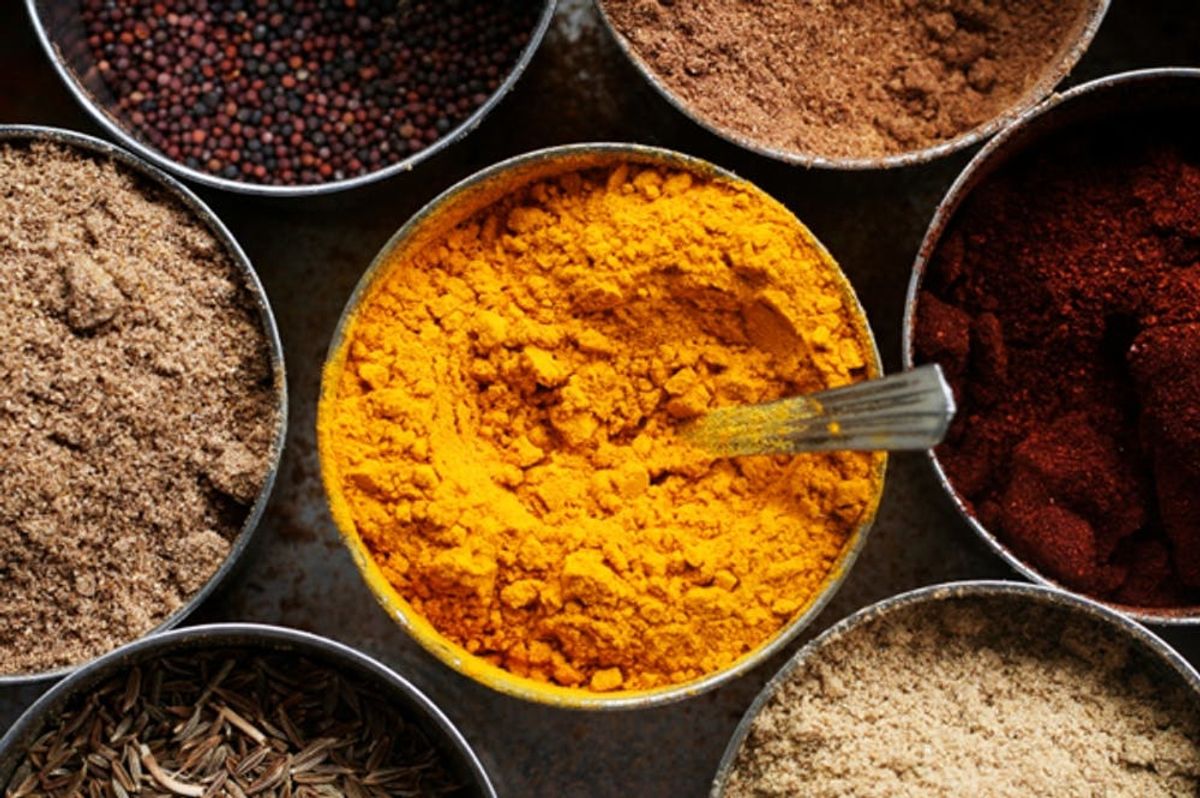There’s a reason explorers traveled thousands of miles and crossed oceans for herbs and spices. Besides making cuisine more delectable, they’ve been long used to promote health and cure disease. We’ve already covered the super foods you should consider, so this time we’ll take a look at the herbs and spices you might think about stocking up on for this autumn and winter. We’ll take a look at how they help us and include a recipe that uses each. Lucky for us, they’re all a quick trip to the supermarket away.
11 Super Herbs and Spices for Your Health

There’s a reason explorers traveled thousands of miles and crossed oceans for herbs and spices. Besides making cuisine more delectable, they’ve been long used to promote health and cure disease.
1. Turmeric: Heavily produced in India and Pakistan, turmeric is a plant (commonly seen as a powder) that has been used for thousands of years in South Asian and Middle Eastern cooking, but also as medicine. Studies indicate that it’s anti-inflammatory and probably effective for an upset stomach or pain caused by osteoarthritis. The host of antioxidants found within, including curcumin may also help to ward off cancer-causing free radicals and Alzheimer’s. (Image via Nourish Medicine)
Recipe Recommendation: Chana Masala
2. Garlic: With it’s pungent odor, foods heavy on garlic may not be the best choice for a first date, but there’s a reason it’s nicknamed the stinking rose. Allicin, a sulfur compound found within may help prevent hair loss. Garlic’s antioxidants can help kill the bacteria that causes acne and are rockstars at preventing the common cold. (Image via DishbyDish.net
Recipe Recommendation: 4 Easy Ways to Use Garlic in Your Meals
3. Ginger: Love or hate that fresh ginger side with your sushi, this root is really good for you. It’s been used for thousands of years in Chinese medicine and among the potent claims are improved circulation, strengthened immunity and defense against motion sickness. The oils in ginger are antiviral and contain antioxidants. (Image via Knox News)
Recipe Recommendation: Ginger Honey Lemon Tonic
4. Cinnamon: Praised by ancient Egyptians, Greeks and Romans for boosting appetite and relieving indigestion, some recent studies show that the spice may be a natural way to lower blood sugar and LDL cholesterol (the bad kind, think L for lethal). Cinnamon also contains anti-infectious compounds which suggests it can be used as part of a healthy diet to prevent getting sick. Add cinnamon to treats and they won’t be just empty calories. (Image via Wikimedia)
Recipe Recommendation: Cinnamon Desserts
5. Saffron: Long used in traditional medicine, saffron is a great source of Vitamin C, Potassium and has a plethora of health benefits. It’s relatively expensive, but the carotenoid compound found within may help fight disease and inhibit tumors. Other benefits include lifting one’s mood, decreasing anxiety and protecting vision by stopping the degeneration of the retina. (Image via NPR)
Recipe Recommendation: Saffron Basmati Rice
6. Cloves: ‘Tis the season for cloves which have an active component called eugenol that guards us from environmental toxins and acts as an anti-bacterial agent. Cloves are also nutrient dense in manganese, Vitamin K and C. (Image via BHL Europe)
Recipe Recommendation: Pumpkin Pie with Cloves
7. Oregano: Another important culinary herb that provides flavor, but also fiber, iron, Vitamin K and high concentrations of antioxidants. Oregano is anti-microbial, anti-inflammatory and may even prevent or slow the progression of some cancers. Use it liberally, but don’t carry it in little bags through airport security ;) (Image via Organico)
Recipe Recommendation: Lemon-Oregano Grilled Jumbo Shrimp
8. Sage: Also well-respected throughout history, sage’s name comes from the Latin word salvere, which means “to be saved”. Rosmarinic acid found within acts an antioxidant and an anti-inflammatory sidekick. I feel cheesy saying this, but it’d be sage advice to use the herb as a brain-booster. In some studies, participants consuming sage had better short-term memory that those who did not. (Image via D’Orsogna)
Recipe Recommendation: 45 Things to Do With Fresh Sage
9. Thyme: Ready for a creepy Halloween-related fact? Ancient Egyptians used thyme as an embalming agent for their mummified pharaohs. But if I had to sum up thyme’s medicinal history, I’d say it specializes as a respiratory aid. Besides being nutrient dense in Vitamin K, iron and manganese, thyme has oil and flavonoid components that help with coughs, bronchitis and chest congestion. (Image via The Cilantropist)
Recipe Recommendation: Pappardelle Pasta with Thyme
10. Rosemary: Native to the Mediterranean, rosemary has an ample supply of iron, calcium and Vitamin B6. Muscle pain, low immunity, poor circulation and hair loss are just some of the maladies people relied on it for. Today we know rosemary may actually be beneficial in those areas because of its antioxidants and anti-inflammatory compounds. More recent studies even credit rosemary with neurological protection and as an effective anti-tumor agent. (Image via Spice Ame Cooks)
Recipe Recommendation: Roasted Rosemary Potatoes
11. Chili Pepper: Whether you crave spicy foods or not, chili peppers may be good for what ails you. Aztecs and Mayans considered it an aphrodisiac and while I can’t vouch for that, we do know chili peppers are high in an antioxidant called capsaicin that can temporarily curb appetite and warm the body. In studies with mice, capsaicin helped kill off cancerous prostate, pancreatic and lung cells. Don’t gorge on chili peppers to prevent cancer, but try and use them if you love spicing up your meals. (Image via Top News)
Recipe Recommendation: Thai Chili Pepper Sauce
Did we miss any essential super herbs or spices? Let us know in the comments below! Also feel free to share your favorite recipes for using any of the herbs and spices listed above.



















